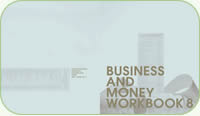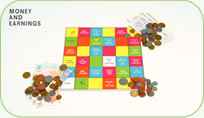 workbook
8
workbook
8Business and money
Workbook 8 contains 5 chapters Chapter 1: Dealing with financial advisers
Chapter 2: Preparing for self employment
Chapter 3: Exploitation of copyright
Chapter 4: The business of performance
Chapter 5: Money and earnings

Financial advisers are professionals that assist you with the financial aspects of your career. They would include an accountant, a book keeper and possibly other specialist advisers for areas such as pensions and investments. They help you to look after your money and tax affairs.
Many talented musicians run into money problems because they do not spend enough time on the "business" side of their career.
As a self-employed (freelance) musician, songwriter, composer, DJ or performer, you are responsible for your own tax and financial affairs. This makes it all the more important to understand what financial advisers can do for you, and when you should use them, in order to avoid making costly mistakes.
It is well known that musicians are often unsure about dealing with financial advisers. This chapter gives you a better understanding of who they are and what they do.
Go to chapter
1 now

The consideration of being self-employed is a reality for many musicians and others working in the music business. Many people are self-employed because it is difficult to gain full time employed work in music.
There are many pro’s and cons to being in business. Positive examples include job satisfaction, Being your own boss and deciding what hours you want to work. Negatives include working unsociable hours, no regular guaranteed income and the issue of taking risks.
In this chapter, we will look at the basic preparation you will need to consider when looking to set up as a self employed person in the music industry.
You will need to ask yourself some tough questions about how committed you really are and how hard you are prepared to work.
You will need to become more aware of the planning and research that goes into starting up a small business.
Go to
Chapter 2 now

It is important to understand the different ways in which you can earn money through writing, recording and performing music.
This chapter explains how the various UK Collection Societies work and the different rights that each of them administer. This is important as you may be entitled to royalty payments if you are a recording artist, writer or performer.
Go to Chapter 3 now

This chapter covers the economics of live performance. In other words, how money is made and lost through gigs.
We will look at small gigs, medium sized and large scale gigs. We will also look at merchandising and club nights.
The business of live performance is substantial. Hundreds of millions of pounds are spent each year in the UK on gigs, concerts, festivals and music shows.
There are many jobs available in this expanding area of music, and money can be made from performing live, whether it’s in a local pub or a huge arena.
However, gigs can end up costing money rather than making it! Being aware of the possible pitfalls can help you to ‘break-even’ at a gig.
Go to Chapter 4 now

This chapter contains a summary of potential income streams and how to manage your finances.
You need to be aware of where you can earn money in the industry and situations that could leave you missing out. Once you make some money you need to manage it! Most of us would much rather get on with the job of being creative, than sit in front of a pile of receipts and paperwork. Being self-employed means being in control of your own business and it is essential to know whether you can make a profit or not!
Go to Chapter 5 now
| Description | Data size | Download time (estimates) |
| Index of workbook 8 | 168Kb | 56K Modem = 23 sec | Broadband = 2 sec |
| Complete Workbook 8 | 5100kb | 56K Modem = 13 minutes | Broadband = 1 min 30s |
All downloads are in Adobe Acrobat PDF format. |
||








